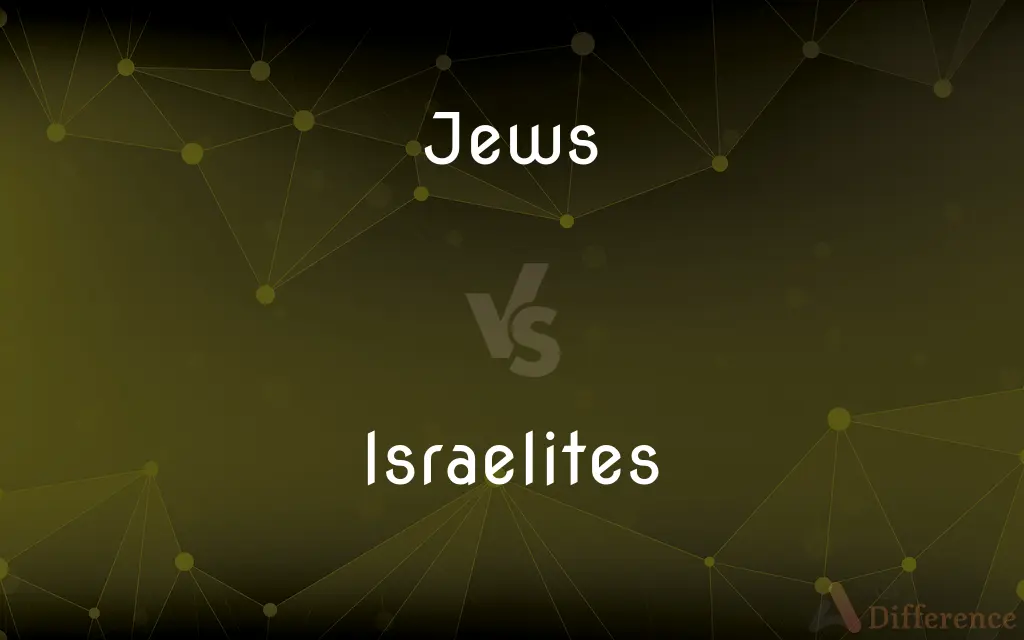Jews vs. Israelites — What's the Difference?
By Urooj Arif & Maham Liaqat — Updated on May 15, 2024
Jews practice Judaism and share a common ancestry, while Israelites were historical figures from the ancient Kingdoms of Israel and Judah.

Difference Between Jews and Israelites
Table of Contents
ADVERTISEMENT
Key Differences
Jews are followers of Judaism, a religious and cultural identity that has evolved over thousands of years. In contrast, the Israelites were an ancient people who lived in what is now Israel and parts of neighboring countries, with their history rooted in biblical times.
Judaism as practiced by Jews encompasses various religious, ethical, and cultural traditions and laws derived from the Hebrew Bible. On the other hand, the Israelites followed ancient Semitic religions and their practices were documented in the Hebrew Bible as part of their covenant with God.
Modern Jews are descended from the Israelites, but the term "Jew" originated from "Judean", referring to inhabitants of the Kingdom of Judah. Whereas, "Israelite" refers specifically to the members of the 12 Tribes of Israel, associated with both the united Kingdom of Israel and its subsequent division.
The term "Jew" also reflects the continuous evolution and diaspora of these people, incorporating a variety of cultural and ethnic identities. On the other hand, "Israelite" specifically denotes the people from the historical and biblical contexts, prior to the Babylonian exile.
While Jews today are connected through shared religion and collective identity that transcends geographical boundaries, the Israelites were directly associated with specific territories and were defined by their tribal and familial ties.
ADVERTISEMENT
Comparison Chart
Definition
Followers of Judaism
Ancient people of Israel/Judah
Time Period
From ancient to modern times
Until around 586 BCE
Cultural Identity
Ethno-religious
Tribal/national
Origin of the Term
From "Judean", related to Judah
From "Israel", the kingdom
Religious Texts
Torah, Talmud
Torah (part of it)
Compare with Definitions
Jews
Members of a people whose traditional religion is Judaism.
Many Jews observe the Sabbath, starting from Friday evening until Saturday evening.
Israelites
Followers of the religious practices dictated in the early parts of the Hebrew Bible.
Israelites celebrated Passover to commemorate their liberation from Egypt.
Jews
Religious community bound by the belief in one God and the teachings of the Torah.
Jews are known for their strong community ties and rich cultural traditions.
Israelites
Members of the ancient people consisting of the 12 Tribes of Israel.
The Israelites were led through the desert by Moses, according to the Bible.
Jews
Descendants of the ancient Hebrews of the Kingdom of Judah.
Jews around the world share a common heritage rooted in the stories of the Hebrew Bible.
Israelites
Inhabitants of the biblical kingdoms of Israel and Judah.
The Israelites divided into two kingdoms after the reign of King Solomon.
Jews
People practicing Jewish customs or culture.
Jews often celebrate Hanukkah, the festival of lights, in December.
Israelites
People governed by biblical laws before the Babylonian Exile.
The Israelites were ruled by judges before the establishment of their monarchy.
Jews
Citizens of Jewish descent living in any country.
Jews in France have a vibrant community, especially in Paris.
Israelites
The Israelites (; Hebrew: בני ישראל, romanized: Bnei Yisra'el) were a confederation of Iron Age Semitic-speaking tribes of the ancient Near East, who inhabited a part of Canaan during the tribal and monarchic periods.In the Hebrew Bible, the term Israelites is used interchangeably with the term Twelve Tribes of Israel. Although related, the terms Hebrews, Israelites, and Jews are not interchangeable in all instances.
Jews
Jews (Hebrew: יְהוּדִים ISO 259-2 Yehudim, Israeli pronunciation [jehuˈdim]) or Jewish people are members of an ethnoreligious group and a nation originating from the Israelites and Hebrews of historical Israel and Judah. Jewish ethnicity, nationhood, and religion are strongly interrelated, as Judaism is the ethnic religion of the Jewish people, although its observance varies from strict to none.Jews originated as an ethnic and religious group in the Middle East during the second millennium BCE, in the part of the Levant known as the Land of Israel.
Israelites
A native or inhabitant of the ancient Northern Kingdom of Israel.
Jews
To bargain shrewdly or unfairly with. Often used with down.
Israelites
A descendant of Jacob; a Jew.
Jews
To haggle so as to reduce (a price). Often used with down.
Israelites
A member of a people regarded as the chosen people of God.
Jews
An adherent of Judaism as a religion or culture.
Israelites
A Jew not descended from the tribe of Levi and not a priest.
Jews
A member of the widely dispersed people originally descended from the ancient Hebrews and sharing an ethnic heritage based on Judaism.
Israelites
Also Is·ra·el·it·ic (ĭz′rē-ə-lĭtĭk) Of or relating to ancient Israel, the ancient Israelites, or their culture.
Jews
A native or inhabitant of the ancient kingdom of Judah.
Israelites
The ethnic group claiming descent from Abraham and Isaac (especially from Isaac's son Jacob); the nation whom God chose to receive his revelation and with whom God chose to make a covenant (Exodus 19)
Jews
Plural of jew
Israelites
Ancient ancestors of modern Jews and Samaritans.
The Israelites' history is foundational to both Jewish and Samaritan traditions.
Jews
Nonstandard spelling of Jews
Common Curiosities
Are all Jews descendants of the Israelites?
Historically, most Jews are considered descendants of the Israelites, though there are conversions and other forms of Jewish identity.
How do religious practices differ between ancient Israelites and modern Jews?
Modern Jews follow a codified set of practices and interpretations (e.g., the Talmud), which have developed since the times of the Israelites.
What is the primary religious text for Jews?
The primary religious texts for Jews are the Torah and the Talmud.
Who were the Israelites?
The Israelites were the members of the 12 Tribes associated with the ancient Kingdoms of Israel and Judah.
What practices did Israelites follow?
Israelites followed various laws and rituals presented in the early books of the Hebrew Bible.
What led to the distinction between Jews and Israelites?
The distinction arose post-Babylonian exile when the term "Jew" began to refer more broadly to those adhering to Jewish faith and culture, beyond just being an inhabitant of Judea.
How do Jews trace their ancestry?
Jews trace their ancestry through maternal lineage to the ancient Hebrews and Israelites.
What distinguishes Israelites from Jews?
Israelites refer to the ancient people directly tied to the biblical lands and narratives, whereas Jews denote the followers of Judaism as it has evolved through history.
What is the significance of the term "Judean"?
"Judean" specifically referred to inhabitants of Judah, a term that evolved into "Jew" over time.
Are there cultural differences between Jews from different parts of the world?
Yes, cultural differences exist, such as Ashkenazi Jews from Europe and Sephardic Jews from the Mediterranean, reflecting diverse histories and practices.
Can someone be a Jew but not an Israelite?
Yes, through conversion to Judaism, individuals become Jews but do not have Israelite ancestry.
What happened to the Kingdom of Israel?
The Kingdom of Israel was conquered by the Assyrians around 722 BCE, leading to the dispersion of some of its tribes.
What role do biblical narratives play in defining Jews and Israelites?
Biblical narratives are central to defining both Jews and Israelites, shaping religious beliefs, practices, and identity.
How has the concept of being an Israelite evolved in Jewish thought?
In Jewish thought, being an Israelite is often viewed historically, with spiritual lineage tracing back to these ancient tribes.
Did Israelites identify as Jews during their time?
The term "Jew" was not used during most of the Israelite period; it became prevalent later, particularly after the Babylonian exile.
Share Your Discovery

Previous Comparison
Risk vs. Threat
Next Comparison
Accustom vs. CustomAuthor Spotlight
Written by
Urooj ArifUrooj is a skilled content writer at Ask Difference, known for her exceptional ability to simplify complex topics into engaging and informative content. With a passion for research and a flair for clear, concise writing, she consistently delivers articles that resonate with our diverse audience.
Co-written by
Maham Liaqat















































